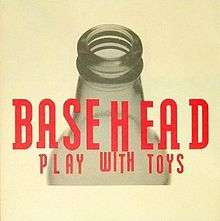Play with Toys
Play with Toys is the debut album of Basehead has been voted one of the top 50 albums of 1992 in Q magazine,[4]
and listed as number 43 in NME’s top albums of 1992.[5] The album was originally released in limited quantities on the Emigre label [ECD 005] and was subsequently re-released on a larger label, Imago, with some of the tracks altered to remove samples that had not been cleared prior to its initial release.
Music and lyrics
The music style of Play with Toys fuses elements of rock, blues,[3][6] funk,[7] hip hop,[8] pop,[8] psychedelic[9] and reggae,[10] and was described as an alternative hip hop "cult favorite".[8] David Jeffries described Play with Toys as "slacker rap".[1] According to Michael Ivey, "There are hip-hop elements in there, but if a hardcore hip-hop fan bought it, they might be disappointed".[10] Ivey also stated that Basehead's music "doesn't have the expected samples and sounds."[11] The lyrical themes of Play with Toys focus on diverse subjects, including alcohol and marijuana use,[6] depression,[1] philosophy,[3] politics,[3] and relationship breakups.[3] Francis Davis wrote that Ivey's lyrics "[subvert] both rock music and gangsta-rap conventions."[6] The instrumentation of Play with Toys was created largely with live instruments rather than samples, which differentiates the album's sound from that of mainstream hip hop.[11] Instruments were altered with studio techniques for effect,[11] and Ivey altered the pitch of his voice for sketches in which he voiced the friends of the album's protagonist. Ivey's vocals mix singing and rapping.[3]
Reception
Rolling Stone reviewer Kevin Powell wrote that "Without being preachy, Basehead's unconventional style challenges listeners to get beyond their basic instincts and open their minds, search their souls."[3]
Track listing
|
| 1. | "Intro" | Ivey | 1:02 |
| 2. | "2000 BC" | Ivey | 4:15 |
| 3. | "Brand New Day" | Ivey | 4:52 |
| 4. | "Not Over You" | Ivey | 4:38 |
| 5. | "Better Days" | Ivey | 3:09 |
| 6. | "Ode to My Favorite Beer" | Ivey | 3:42 |
| 7. | "Hair" | Ivey | 3:48 |
| 8. | "Evening News" | Ivey | 4:37 |
| 9. | "I Try" | Ivey | 3:53 |
| 10. | "Play with Toys" | Ivey | 4:03 |
| 11. | "Outro" | Ivey | 2:56 |
| Total length: | 40:59 |
Personnel
- Michael Ivey – guitar, vocals
- Brian Hendrix – live drums
- Bruce 'Kool Aid' Gardner - live drums on "2000 BC"
- Paul 'DJ Unique' Howard - scratches
- Bob Dewald - bass on "Play with Toys"
- Marco Delmar - feedback solo on "Play with Toys"
References
- 1 2 3 4 Jeffries, David. "Review of Play with Toys". Allmusic. Retrieved December 6, 2009.
- ↑ Allen, Jim (February 1993). "The Ten Best Albums of 1992". Fast Folk Musical Magazine 6:9-10, p.12-13.
- 1 2 3 4 5 6 7 Powell, Kevin (July 9, 1992). "Review of Play with Toys". Rolling Stone. Archived from the original on November 12, 2007. Retrieved February 18, 2009.
- ↑ Q - End of Year Lists
- ↑ 1992 NME Lists
- 1 2 3 Davis, Francis (2004). "Black Faces, Black Masks". Jazz and its Discontents. A Francis Davis Reader. Da Capo Press. p. 264. ISBN 0-306-81055-7.
- ↑ Kiviat, Steve (October 11, 1996). "You Gotta Have Faith". Washington City Paper. Retrieved February 18, 2009.
- 1 2 3 Erlewine, Stephen Thomas. "Biography of Basehead". Allmusic. Retrieved February 18, 2009.
- ↑ Erlewine, Stephen Thomas. "Review of Not in Kansas Anymore". Allmusic. Retrieved February 18, 2009.
- 1 2 Larkin, Colin (1998). "Basehead". The Virgin Encyclopedia of Dance Music. Virgin. p. 27. ISBN 0-7535-0252-6.
- 1 2 3 Morris, Chris (March 6, 1993). "Basehead Asks: Do You Wanna (Moan)?". Billboard. 105 (10): 26.
